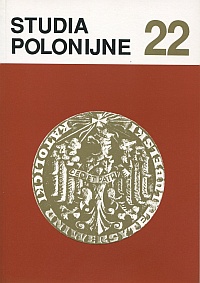Polacy w rosyjskiej Mandżurii
Main Article Content
Abstrakt
Manchuria, an enormous geographic territory in eastern Asia, inhabited by peoples belonging to the Tungusic language family, has for hundreds of years been part of China. At present, in result of the conquest started in 1849, and treatises of 1858-1860 extracted by force from China, its northern part together with the Ussurian Country (Primorje), constitutes an integral part of the Russian state. This annexation triggered Polish history in these territories. The first Polish settlers in Manchuria were soldiers from the November uprising sent into exile to the Russian-Chinese border. Even before that those Poles who were convicted for their opposition against the Russian rule were put in border garrisons. After 1831, however, the influx of soldiers of Polish origin, including recruits, was so large that in the garrisons of the General Amurian Province every second soldier was Polish. They were used not only as armed forces, but also dealt with scientific research, administration and development of the occupied territories. Among them captain Jan Czerkawski was involved in the construction of almost all Russian posts on the Amur and was made the first commanding officer of Vladivostok, today a 650.000-harbour city.
After the defeat of the January Uprising in Polish territories thousands of insurgents and civilians were sent into exile. Official data report ten thousand Poles exiled to East Siberia. From the 1880s onwards, when the Russian plan to colonize Manchuria and Primorje was put into effect, the exiles were sent only to Sakhalin. The most prominent of the Polish convicts on this island was Bronislaw Piłsudski, a brother of the future marshal and chief of the regenerated Poland. He was exiled there in 1886. His research on the language and culture of the natives of Sakhalin: the Ainu and the Gilac people brought him fame and earlier release from exile. Among the Polish convicts on the island there were numerous socialistic activists, and the last group of Polish political exiles in Far East consisted of the revolutionaries of 1905. They gained freedom as late as 1917, when the czar was overthrown. Historian s unanimously claim that at that time in the territory from the Urals to Manchuria the term "political exile" was synonymous to a Pole.
Numerous Polish scholars conducted research in the territories of Russian Manchuria, among others, Benedykt Dybowski (1833-1930), anthropologist Julian Talko Hrycewicz (1850- 1936), geologists Kazimierz Grochowski (1873-1937) and Emil Dunikowski (1855-1924), mining engineer Witold Sągajłlo (1871-1963), and botanist Karol Rothert (1863-1916). Manchuria was developed and settled by voluntary Polish emigrants, as a result of mass confiscations of Polish estates and the 1865 ban on land purchase. Poles could not purchase land in nine provinces of western Russia. Several thousand of workers and many Polish engineers worked at the construction of the Trans-Siberian railway, but only a few hundred of them settled in Manchuria. The same number of Poles served in the Russian armed forces in Far East. There were numerous Polish doctors and entrepreneurs. Until the outbreak of the Russian Revolution every twelfth inhabitant of Vladivostok was a Pole. According to the then observers and contemporary historians, the Poles played a considerable role in promoting the elements o f European culture and civilization in those territories.
The Polish community which numbered about 30.000 people started to establish their own organizational structures after 1863. Those structures were closely linked with the Roman- Catholic Church. The reason for this link was the fact that the czar authorities were willing to tolerate only religious difference. In the minds of the Poles, however, it was closely linked with the sense of national autonomy. Thus in the safe niche of the Church there were established Polish societies of self-help and Polish schools. The fall of the czar authorities in Russia and the regeneration of independent Poland entailed a wave of repatriation , the wave supported by the representatives of the Polish government in Russia. Until 1922 almost 20.000 Poles had left Russia, often in dramatic conditions. Repatriation of Polish orphans is a special episode of those years, the action was conducted by the Committee of Help to Children of Far East established in Harbin.
The Stalin terror of the 1930s totally destructed the Polish community in Russian Manchuria. The church structures were abolished, and the majority of Poles sent to Soviet labour camps. It was only Germans’ attack on the Soviet Union (1941) that brought about the release of Poles from prisons and camps, so that they could form a Polish army in Soviet territories. Nevertheless, immediately after the war the relations between the Soviet authorities and the Polish government in London had been broken. The repatriation of 1944-1948 involved over 6.000 Poles from Eastern Siberia, but nobody returned from Russian Manchuria then. All in all, about 5.000 Poles had no opportunity to go back to their homeland.
At the moment, together with the fall of the Soviet Union, the Polish community in Manchuria numbering a few hundred has regenerated. In Vladivostok and Khabarovsk churches were regained and Polish associations established. The origins of the Polish -Russian economic cooperation in this region hold promise that the account of wrongs and persecutions can ultimately be closed. There is a hope for mutual friendly relations between Poles and Russians, now as free nations.

